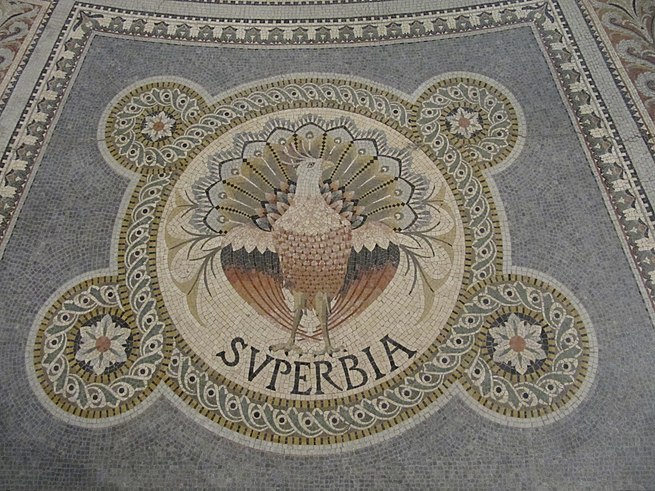
Main Difference
The main difference between Pride and Vanity is that the Pride is a inwardly directed emotion that carries two common meanings and Vanity is a excessive concern for one’s own perfection
-
Pride
Pride is an inwardly directed emotion that carries two antithetical meanings. With a negative connotation pride refers to a foolishly and irrationally corrupt sense of one’s personal value, status or accomplishments, used synonymously with hubris. With a positive connotation, pride refers to a humble and content sense of attachment toward one’s own or another’s choices and actions, or toward a whole group of people, and is a product of praise, independent self-reflection, and a fulfilled feeling of belonging.
In Judaism, pride is called the root of all evil. In Christianity, pride is the original and most serious of the seven deadly sins, the father of all sins.
Philosophers and social psychologists have noted that pride is a complex secondary emotion which requires the development of a sense of self and the mastery of relevant conceptual distinctions (e.g. that pride is distinct from happiness and joy) through language-based interaction with others. Some social psychologists identify the nonverbal expression of pride as a means of sending a functional, automatically perceived signal of high social status. In contrast, pride could also be defined as a lowly disagreement with the truth. One definition of pride in the former sense comes from St. Augustine: “the love of one’s own excellence”. A similar definition comes from Meher Baba: “Pride is the specific feeling through which egoism manifests.”
Pride is sometimes viewed as corrupt or as a vice, sometimes as proper or as a virtue. While some philosophers such as Aristotle (and George Bernard Shaw) consider pride (but not hubris) a profound virtue, some world religions consider pride’s fraudulent form a sin, such as is expressed in Proverbs 11:2 of the Hebrew Bible. When viewed as a virtue, pride in one’s abilities is known as virtuous pride, greatness of soul or magnanimity, but when viewed as a vice it is often known to be self-idolatry, sadistic contempt, vanity or vainglory. Pride can also manifest itself as a high opinion of one’s nation (national pride) and ethnicity (ethnic pride).
-
Vanity
Vanity is the excessive belief in one’s own abilities or attractiveness to others. Prior to the 14th century it did not have such narcissistic undertones, and merely meant futility. The related term vainglory is now often seen as an archaic synonym for vanity, but originally meant boasting in vain, i.e. unjustified boasting; although glory is now seen as having a predominantly positive meaning, the Latin term from which it derives, gloria, roughly means boasting, and was often used as a negative criticism.
-
Pride (noun)
The quality or state of being proud; an unreasonable overestimation of one’s own superiority in talents, beauty, wealth, rank etc., which manifests itself in lofty airs, distance, reserve and often contempt of others.
-
Pride (noun)
A sense of one’s own worth, and abhorrence of what is beneath or unworthy of one; lofty self-respect; noble self-esteem; elevation of character; dignified bearing; proud delight; — in a good sense.
“He took pride in his work.”
“He had pride of ownership in his department.”
-
Pride (noun)
Proud or disdainful behavior or treatment; insolence or arrogance of demeanor; haughty bearing and conduct; insolent exultation; disdain; hubris.
-
Pride (noun)
That of which one is proud; that which excites boasting or self-congratulation; the occasion or ground of self-esteem, or of arrogant and presumptuous confidence, as beauty, ornament, noble character, children, etc.
-
Pride (noun)
Show; ostentation; glory.
-
Pride (noun)
Highest pitch; elevation reached; loftiness; prime; glory,
-
Pride (noun)
Consciousness of power; fullness of animal spirits; mettle; wantonness.
-
Pride (noun)
Lust; sexual desire; especially, excitement of sexual appetite in a female beast.
-
Pride (noun)
A company of lions or other large felines.
“A pride of lions often consists of a dominant male, his harem and their offspring, but young adult males ‘leave home’ to roam about as bachelors pride until able to seize/establish a family pride of their own.”
-
Pride (noun)
The small European lamprey species noshow=1.
-
Pride (noun)
.
-
Pride (verb)
To take or experience pride in something; to be proud of it.
“I pride myself on being a good judge of character.”
-
Vanity (noun)
That which is vain, futile, or worthless; that which is of no value, use or profit.
-
Vanity (noun)
Excessive pride in or admiration of one’s own abilities, appearance or achievements.
-
Vanity (noun)
A dressing table used to apply makeup, preen, and coif hair. The table is normally quite low and similar to a desk, with drawers and one or more mirrors on top. Either a chair or bench is used to sit upon.
-
Vanity (noun)
A washbasin installed into a permanently fixed storage unit, used as an item of bathroom furniture.
-
Vanity (noun)
Emptiness.
-
Vanity (noun)
Any idea, theory or statement that is without foundation.
-
Vanity (noun)
excessive pride in or admiration of one’s own appearance or achievements
“the vanities and ambitions of politicians”
“it flattered his vanity to think I was in love with him”
-
Vanity (noun)
denoting a person or company publishing works at the author’s expense
“a vanity press”
-
Vanity (noun)
the quality of being worthless or futile
“the vanity of human wishes”
-
Vanity (noun)
a dressing table.
